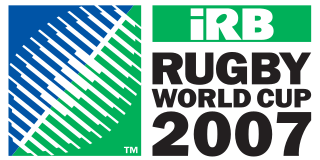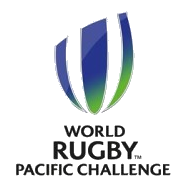
The 2007 Rugby World Cup was the sixth Rugby World Cup, a quadrennial international rugby union competition organised by the International Rugby Board. Twenty nations competed for the Webb Ellis Cup in the tournament, which was hosted by France from 7 September to 20 October. France won the hosting rights in 2003, beating a bid from England. The competition consisted of 48 matches over 44 days; 42 matches were played in 10 cities throughout France, as well as four in Cardiff, Wales, and two in Edinburgh, Scotland.
The Pacific Tri-Nations was the traditional rugby union series between Tonga, Fiji and Samoa. It was established in 1982 with the Samoan team, then known as Western Samoa, winning the tournament. In 2006 it was replaced by the IRB Pacific 5 Nations which was then renamed the Pacific Nations Cup.
There were 20 places available for the 2007 Rugby World Cup held in France. The 86 teams taking part in regional qualifying competitions together with the 8 teams which have qualified automatically brings to 94 the total number of teams participating in the 2007 Rugby World Cup.
In qualification for the 2007 Rugby World Cup, thirteen Asian Rugby Football Union (ARFU) nations compete for one full place, and one repechage place. No Asian teams qualified for the quarter-finals in 2003, so none qualify automatically in 2007. Only Japan has been to the World Cup, participating in all five RWCs to date, with only one win in 1991 (England) against Zimbabwe, 52–8. Asia 1 will go into Group B with Australia, Wales, Fiji and Canada.
In qualification for the 2007 Rugby World Cup, 19 countries in the Pan American Rugby Association (PARA) compete for 3 direct entries and 1 repechage place against the winner of Africa 2 v Europe 4.

The World Rugby Pacific Challenge, formerly the IRB Pacific Rugby Cup, is an annual rugby union football tournament held in Oceania since 2006. It is contested by national 'A' teams from the Asia-Pacific region. The tournament is run by World Rugby through Oceania Rugby.
In qualification for the 2003 Rugby World Cup, a number of positions were available to Oceania nations. Fiji and Samoa qualified, joining automatic qualifiers Australia and New Zealand, while Tonga progressed to the repechage, where they faced South Korea.

The Papua New Guinea women's national soccer team is controlled by the Papua New Guinea Football Association (PNGFA). Its nickname is the Lakatois, which is a Motuan sailing vessel. Their home ground is the Sir Hubert Murray Stadium, located in Port Moresby and their current manager is Peter Gunemba. Deslyn Siniu is the team's most capped player and top scorer.

Rugby union in Asia is governed by the Asian Rugby Football Union (ARFU). As of December 2009 there are 28 ARFU member unions, of whom 15 are full members of World Rugby, and six further associate members of World Rugby in Asia. The flagship tournament for promoting the sport in Asia is the Asian Five Nations, which launched in 2008, and which most recently in 2011 saw the national teams of Hong Kong, Japan, Kazakhstan, Sri Lanka and the UAE, compete in the main tournament.

2011 Rugby World Cup qualifying began at the 2007 tournament in France, where twelve teams earned a place in the finals of the tournament, this automatically qualified them for the 2011 Rugby World Cup in New Zealand.
The Federation of Oceania Rugby Unions (FORU) section of the 2015 Rugby World Cup qualification involved five teams competing for one spot in the final tournament in England.
Association football is one of the popular sports in Oceania, and 2 members of the Oceania Football Confederation (OFC) have competed at the sport's biggest event – the men's FIFA World Cup.
For the 1999 Rugby World Cup qualifiers, the Oceanian Federation was allocated three places in the final tournament and one place in the repechage.

The qualification process for the 2019 Rugby World Cup in Japan began during the pool stages of the 2015 tournament in England, during which the top three teams from each of the four pools were awarded automatic qualification for the 2019 event. A further eight teams qualified through regional, cross-regional tournaments and the repechage process.
Qualifying for the 2019 Rugby World Cup for Oceania Rugby began in June 2016, where across 2 years, 3 teams competed for two direct qualification spots from Oceania. Two places were available to Oceania in a cross-regional play-off series' to qualify for the World Cup and or advance through the Repechage.
For the 2019 Rugby World Cup, there were several play-off matches during the qualification process in order to determine which nations would compete in the Repechage. Canada, who failed to be one of the three teams to advance from the Americas qualification process, despite being the third highest ranked team in the Americas, emerged from the repechage process in November 2018 to become the final team to qualify for the World Cup.
The Papua New Guinea women's national rugby union team played their first international against Fiji in 2016. They compete annually in the Oceania Rugby Women's Championship, and have not qualified for the Rugby World Cup as yet.
The qualification process for the 2023 Rugby World Cup in France began during the pool stages of the 2019 tournament in Japan, at which the top three teams from each of the four pools qualified automatically for the 2023 event. A further eight teams qualified through regional, cross-regional play-offs and the repechage process.

The qualification process for the 2021 Rugby World Cup began on 9 August 2019 with 12 teams qualifying to the tournament which was to be held in New Zealand. The 2021 Rugby World Cup was postponed by one year in March 2021 to 2022 due to the COVID-19 pandemic.
The 2019 Oceania Rugby Women's Championship that was held in Fiji, was the 2021 Rugby World Cup qualifier for the Oceania region. The tournament was played at Churchill Park in Lautoka from 18 to 30 November 2019, with six teams entered. Australia and New Zealand sent development teams, having already qualified for the 2021 World Cup.






